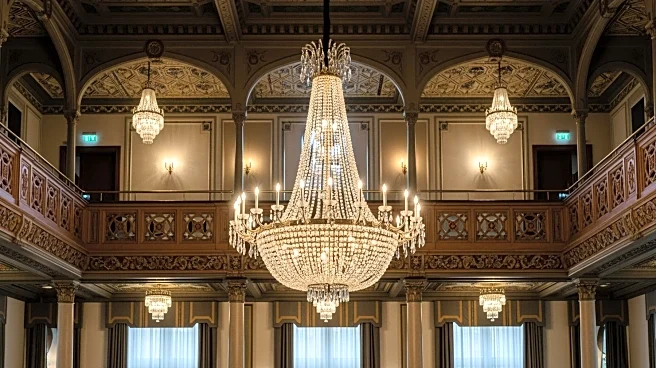What's Happening?
Hilton has launched the Waldorf Astoria Helsinki, marking its first property in the Nordic region. The hotel, owned by M&L Group, is situated in four historic buildings designed by Finnish architects Evert
Lagerspetz and Armas Siitonen. It features 116 rooms, including 32 suites, each showcasing a blend of Nordic minimalism and modern design. The hotel offers unique amenities such as in-room saunas, steam rooms, and private terraces with jacuzzis. Located in a historic neighborhood, the property is close to landmarks like Helsinki Cathedral and Market Square. The Waldorf Astoria Helsinki also includes the Peacock Bar, inspired by the Peacock Alley at Waldorf Astoria New York, and a Nordic Wellness Spa with traditional Finnish sauna experiences.
Why It's Important?
The opening of Waldorf Astoria Helsinki signifies Hilton's strategic expansion into the Nordic region, enhancing its global luxury portfolio. This development is crucial for Hilton as it taps into the growing demand for high-end accommodations in Europe. The hotel aims to attract affluent travelers seeking unique cultural and wellness experiences, potentially boosting local tourism and economy. The presence of a luxury brand like Waldorf Astoria in Helsinki could elevate the city's status as a premium travel destination, encouraging further investment in the hospitality sector.
What's Next?
Looking ahead, Hilton plans to expand the Waldorf Astoria brand into other gateway cities such as London, Sydney, and Jakarta by 2026. This expansion strategy indicates Hilton's commitment to increasing its footprint in key international markets. The Waldorf Astoria Helsinki will continue to enhance its offerings with a new restaurant set to open in early 2026, further enriching the guest experience. The hotel is part of the Hilton Honors program, providing members with exclusive benefits and access to contactless technology, which may attract more loyalty program participants.
Beyond the Headlines
The introduction of Waldorf Astoria Helsinki could influence cultural perceptions of luxury hospitality in the Nordic region, blending local design heritage with global luxury standards. This move may inspire other luxury brands to consider similar expansions, potentially leading to increased competition and innovation in the hospitality industry. The hotel's emphasis on personalized service and wellness experiences reflects broader trends in the industry, where customization and health-focused amenities are becoming increasingly important to travelers.









